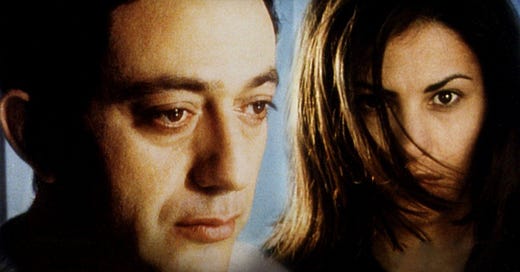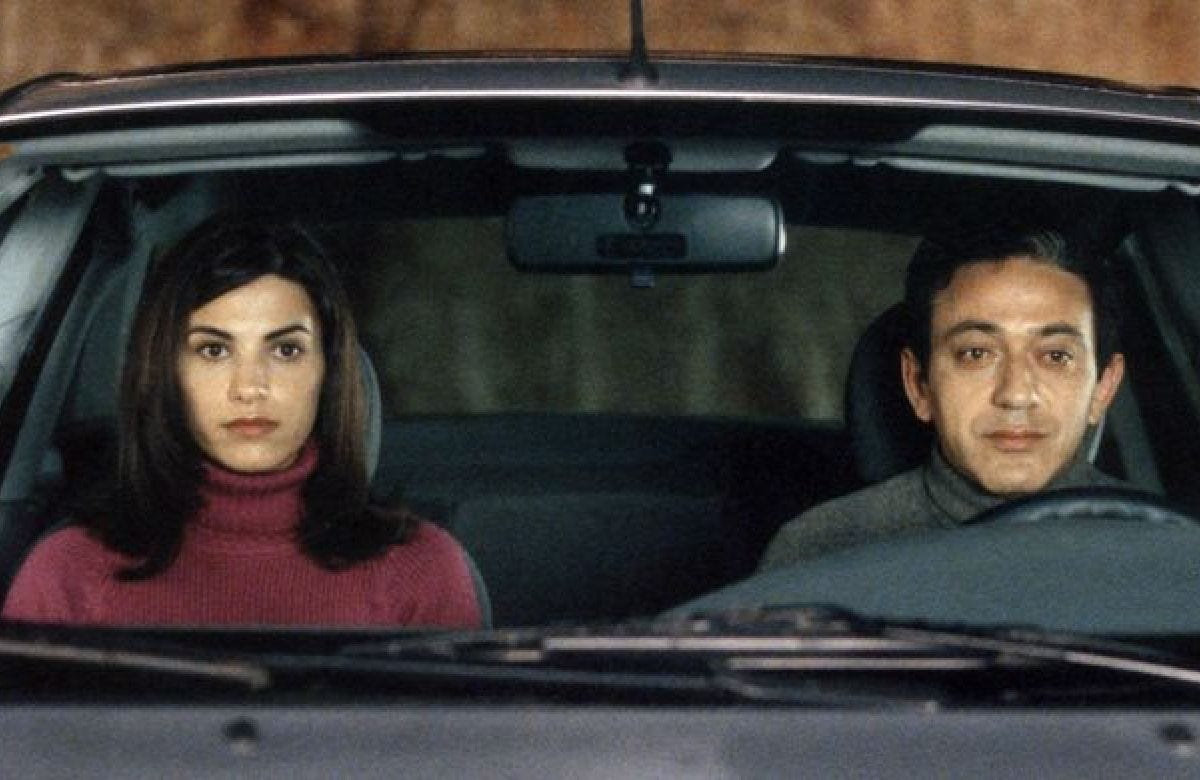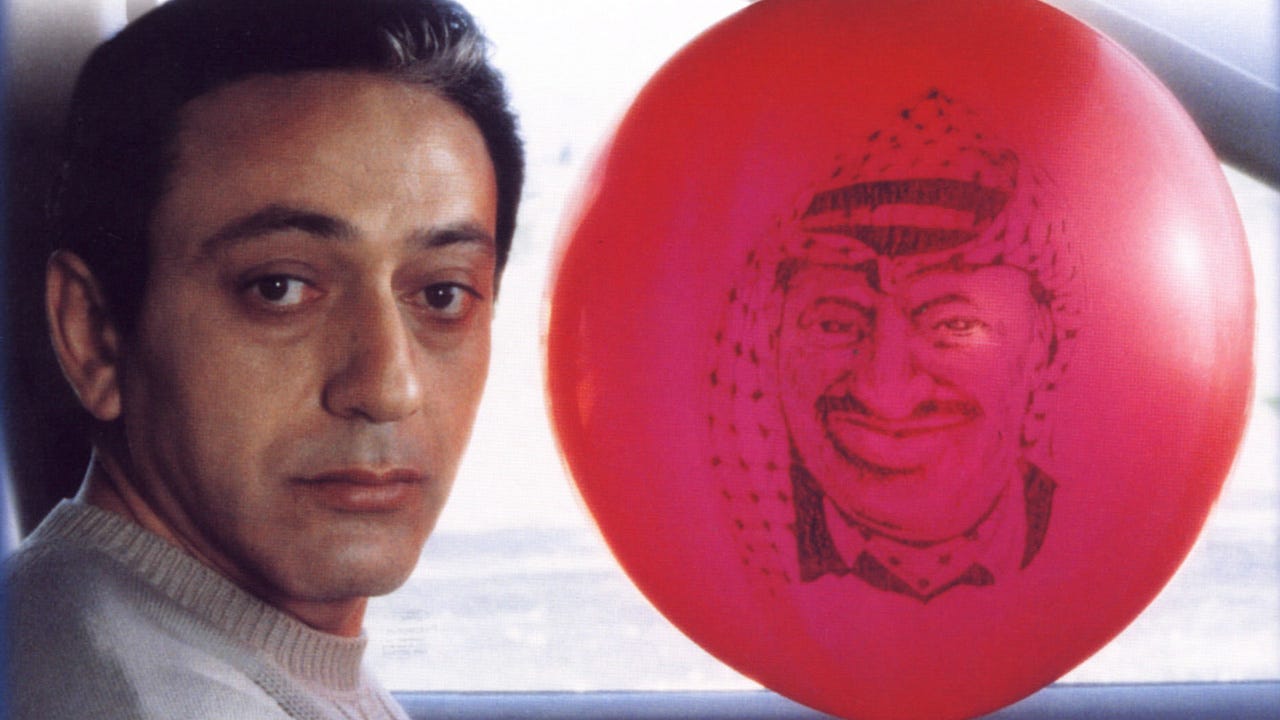Directed by Elia Suleiman
France & Palestinian territories, 2002
“I don’t make subversive films.” So says Elia Suleiman, the Palestinian filmmaker, when surveying his catalogue of work. Divine Intervention is the second of his four feature films, all reflecting on the story of Palestinian dispossession, here by highlighting the absurdities of day-to-day life in the Occupied Territories.
Like all of his films, Divine Intervention is a series of vignettes stitched together with a connecting thread. That thread is the story of a man and a woman, lovers who are living in different towns: Nazareth in Israel and Ramallah in the West Bank. Because of the difficulty in navigating checkpoints, they usually meet in a border carpark and sit holding hands, watching the Israeli guards at work.
The man in question is the director, Elia Suleiman. He stars in the film yet doesn’t say a word, he remains mute and adopts an affectless, deadpan persona highly reminiscent of the Great Stone face himself, Buster Keaton. Reportedly he finally utters four words in his latest film, It Must Be Heaven: “I am a Palestinian”.
Divine Intervention is a bleak, but at times blisteringly funny film. It’s clearly a commentary on the Israeli–Palestinian conflict but Suleiman doesn’t appear to be making any argument, at least not one that is explicit. Rather we are witness to the trauma of the conflict hidden beneath the humdrum, day-to-day activities of life, such as putting out your rubbish or opening your post. Everyday jobs are caught up in an atmosphere of seething resentment and paranoia.
A boy is doing kick ups with a football, and we see two old men sitting on their roof watching as the ball goes up and down. It inevitably ends up on the roof and a neighbour comes along and punctures it with a knife. A man digs up his driveway so that his neighbour’s car falls into the hole. When the police arrive to arrest him, he climbs to his to the rooftop of his house to toss an amassed collection of bottles at them.
I can’t think of a better political film that I’ve seen. So often political films treat the camera as some kind of truth telling objective medium – C
These scenes are framed with precision and work like a silent comedy – that Keaton reference again. There is often an Ozu-like stillness to the way Suleiman composes his shots. You can see congruities with the last film we reviewed, Late Spring. Suleiman makes that point himself:
When I encountered Ozu’s films I had an instant identification with his point of view of where to put the camera. I felt his cinema resembled the ambience of where I came from – the political situation, trying to live a life of normalcy under occupation. His films gave you the sense of the alienation that the elder generation felt in terms of what had happened to them, a sense of denial.
Because of the sustained periods of quiet, dialogue when it happens is striking. In one sketch an English-speaking tourist asks an Israeli cop the way to the Holy Sepulchre. He is unsure so goes to the back of the police van. He pulls out a blindfolded and handcuffed detainee who is able to give her directions.
I think one of the things the director does best is allowing the film to take its time with everything – T
These naturalistic, observational scenes work much better than the, thankfully few, surreal flights of fancy. We watch as a red balloon floating through a checkpoint and over the Holy City emblazoned with the smiling face of the former leader of the PLO, Yasser Arafat – once so instantly recognisable, but who recalls him now? And then a Bollywood-type CGI sequence where a female ninja wipes out a squad of Israeli commandos who are using pictures of Palestinian women for target practice. This threatens to mar the tone of the whole film.
Divine Intervention shares its wit and a sense of dramatic irony with two other political satires: The Death of Stalin and Four Lions, but here there is a palpable sense of violence lurking beneath the surface. As the film reaches its end Suleiman’s car is blocked in his garage by another car. A passing driver stops and relates an anecdote. His own car was obstructed just the day before, so he sent someone to look for the driver and waited…and waited. When this man eventually turns up, not only does he not move his car, but he starts to wash it. The two men argue, things escalate, the driver’s family joins in, and the obstructing man ends up in hospital with all of his ribs broken. “He wanted to clean his car, the son of a whore”, he tells us before driving away.
The final scene is the simplest but perhaps the most powerful of all. Suleiman and his mother sit side-by-side on a sofa, watching a pressure cooker. It’s whistling and they continue watching it. Eventually his mother says, “That’s enough...stop it now”.
I think the film is bringing into question the role of the director and his politics in so-called political film. When the film is being overtly political, it moves into absurdity. That’s not to say it’s a neutral film, but I think it’s self-reflexive in examining the directors own prejudices and challenging those as well as those on the other sides – C
Divine Intervention won the International Critics’ Prize at Cannes so was submitted to the Best Foreign Language Film category at the Oscars. It was rejected because entries must be nominated by their country of origin, and the Academy did not consider Palestine a nation. The perfect absurdist coda.
Elia Suleiman: a huge American producer introduced me to Clint Eastwood. He was the head of Warner Bros, and told Clint, “He’s Palestinian, but he makes funny films.” Clint winked at me and said, “Well, shit happens.”
Reids’ Results (out of 100)
C - 75
T - 72
N - 73
S - 66
Thank you for reading Reids on Film. If you enjoyed this review please share with a friend and do leave a comment.
Coming next … The Long Good Friday(1980)






